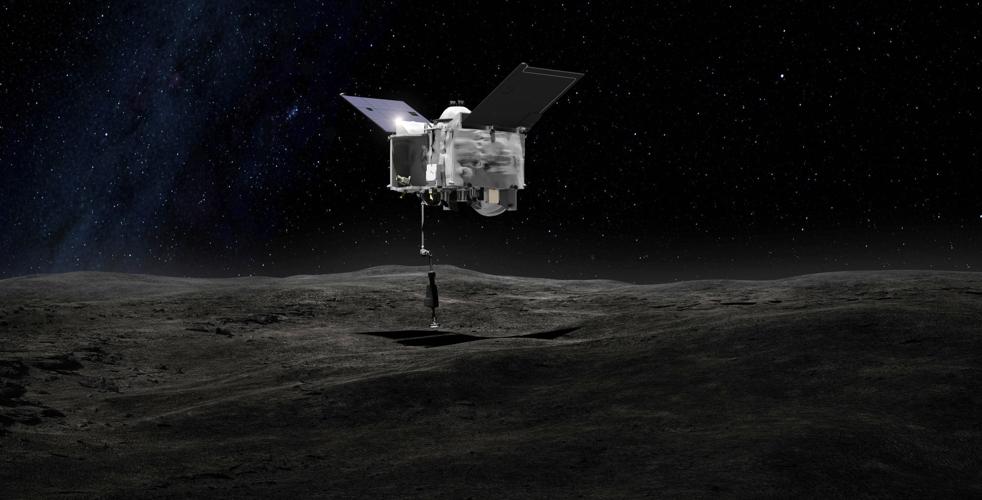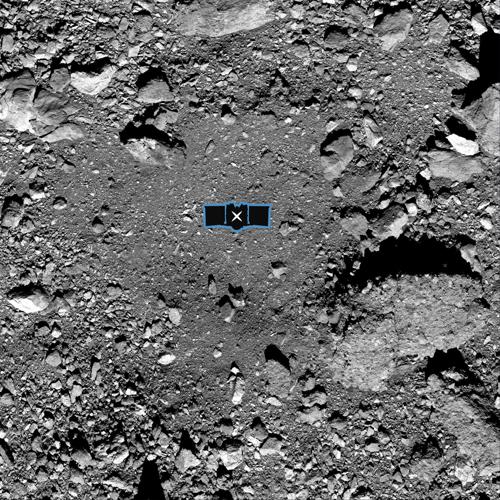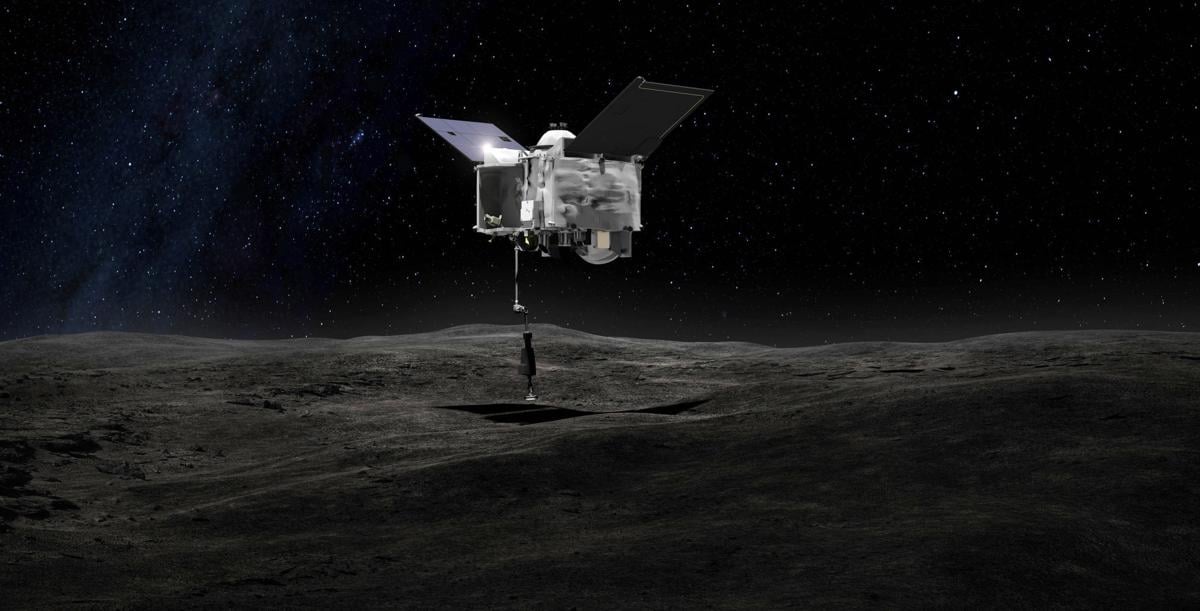Football might get canceled by the coronavirus, but the University of Arizona has at least one touchdown on the schedule for this fall.
The university-led OSIRIS-REx mission has set an Oct. 20 date for the spacecraft to reach down and grab a sample from the rocky surface of the asteroid Bennu, tens of millions of miles from Earth.
First, though, team members are slated to make one more practice run on Aug. 11. They successfully completed their first rehearsal last month in preparation for the delicate, touch-and-go collection maneuver that will have the spacecraft’s sampling arm in contact with the surface for about five seconds.
The sample collection was originally expected to occur in August, but it was delayed amid disruptions caused by the COVID-19 pandemic.
“We want to provide the team more time to see if there’s anything we can do to improve the mission’s probability of success,” said the UA’s Heather Enos, deputy principal investigator for OSIRIS-REx, in a written statement. “The fact that this is such a long mission means there’s more opportunity to experience the unexpected. We knew that and planned for it. I’m in awe of how adaptable this team is.”
OSIRIS-REx has three major partners: Lockheed Martin, NASA’s Goddard Space Flight Center and the University of Arizona.
The spacecraft was launched in 2016 and entered orbit around Bennu at the end of 2018, after a two-year, 1.25-billion-mile journey to chase down the asteroid.

The Nightingale site, located in the asteroid Bennu, is where the OSIRIS-REx mission hopes to collect up to 4.4 pounds of samples to help provide clues on life’s origins.
In December, the team officially unveiled the spot where it plans to collect up to 4.4 pounds of samples: a site called “Nightingale” located in a 230-foot crater in Bennu’s northern hemisphere.
The spacecraft is then scheduled to leave Bennu in March 2021 and return to Earth with its precious cargo on Sept. 24, 2023.
Researchers are hoping the samples on board will provide clues about the origins of life and the early history of the solar system.
Photos: Flowing Wells High School 2020 drive-thru graduation
Flowing Wells Graduation
Updated
Sierra Moore watches fellow graduating seniors walks across stage as she wait for her turn in a line of vehicles during the second night of drive through graduations at John M. Mead Athletic Arena at Flowing Wells High School, on May 20, 2020.
Flowing Wells Graduation
Updated
Wearing a plague doctor mask Gabrielle Trede makes adjustments to cap and gown while walking towards the stage during the second night of drive through graduations at John M. Mead Athletic Arena at Flowing Wells High School, on May 20, 2020.
Flowing Wells Graduation
Updated
Uyen-My Nguyen adjusts her mask as she makes her way to the stage to receive her diploma during the second night of drive through graduations at John M. Mead Athletic Arena at Flowing Wells High School, on May 20, 2020.
Flowing Wells Graduation
Updated
A graduated senior looks out of the backseat of a car while waiting to exit the second night of drive through graduations at John M. Mead Athletic Arena at Flowing Wells High School, on May 20, 2020.
Flowing Wells Graduation
Updated
A graduating senior is assisted with her cap during the second night of drive through graduations at John M. Mead Athletic Arena at Flowing Wells High School, on May 20, 2020.
Flowing Wells Graduation
Updated
Sergio Vega Velderrain walks through confetti on his way to the stage during the second night of drive through graduations at John M. Mead Athletic Arena at Flowing Wells High School, on May 20, 2020.
Flowing Wells Graduation
Updated
Graduating senior Chloe Luke drops her name card into a basket as she walks across the stage during the second night of drive through graduations at John M. Mead Athletic Arena at Flowing Wells High School, on May 20, 2020.
Flowing Wells Graduation
Updated
A graduate holds balloons while waiting outside his vehicle on the way out of a drive through graduations at John M. Mead Athletic Arena at Flowing Wells High School, on May 20, 2020.
Flowing Wells Graduation
Updated
A graduating senior exits a truck to take her turn walking across the stage during the second night of drive through graduations at John M. Mead Athletic Arena at Flowing Wells High School, on May 20, 2020.
Flowing Wells Graduation
Updated
A truck's grill decorated with "2020" during the second night of drive through graduations at John M. Mead Athletic Arena at Flowing Wells High School, on May 20, 2020.
Flowing Wells Graduation
Updated
Hailey Moore wait to take the stage during the second night of drive through graduations at John M. Mead Athletic Arena at Flowing Wells High School, on May 20, 2020.
Flowing Wells Graduation
Updated
A supporter of a graduate sits in the bed of a truck during the second night of drive through graduations at John M. Mead Athletic Arena at Flowing Wells High School, on May 20, 2020.
Flowing Wells Graduation
Updated
Family and friends of a graduate pop confetti in the air during the second night of drive through graduations at John M. Mead Athletic Arena at Flowing Wells High School, on May 20, 2020.
Flowing Wells Graduation
Updated
A graduating senior takes the stage to receive his diploma during the second night of drive through graduations at John M. Mead Athletic Arena at Flowing Wells High School, on May 20, 2020.
Flowing Wells Graduation
Updated
Uyen-My Nguyen makes her walks across the field at John M. Mead Athletic Arena to go back to her family's vehicle during a drive through graduation ceremony at Flowing Wells High School, on May 20, 2020.
Flowing Wells Graduation
Updated
A graduated senior has his photo taken during the second night of drive through graduations at John M. Mead Athletic Arena at Flowing Wells High School, on May 20, 2020.
Flowing Wells Graduation
Updated
Vehicles make their way around John M. Mead Athletic Arena during a drive through graduation ceremony at Flowing Wells High School, on May 20, 2020.
Flowing Wells Graduation
Updated
Melanie Perla Linares waits to take the stage during the second night of drive through graduations at John M. Mead Athletic Arena at Flowing Wells High School, on May 20, 2020.
Flowing Wells Graduation
Updated
Wearing a plague doctor mask Gabrielle Trede makes adjustments to cap and gown while walking towards the stage during the second night of drive through graduations at John M. Mead Athletic Arena at Flowing Wells High School, on May 20, 2020.
Flowing Wells Graduation
Updated
Vehicles make their way around John M. Mead Athletic Arena during a drive through graduation ceremony at Flowing Wells High School, on May 20, 2020.






